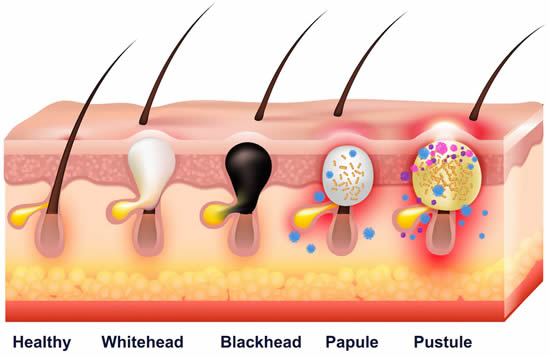
Causes
No one has found the exact cause of acne but several factors contribute to breakouts, such as bacteria, clogged pores, excess oil and inflammation. Sebum, an oil produced by the body to keep skin from drying out, flow increases significantly during adolescence when the body is under the influence of changing hormones. Since only some of the excess sebum can flow freely to the skin’s surface, clogged pores result.
Types of Acne
Acne takes several forms:
- Comedones (whiteheads and blackheads)
With slight inflammation, the sebum flow is blocked close to the skin’s surface, and you get a blackhead or whitehead.
- Papules
Small, raised bumps, papules indicate inflammation or infection in the hair follicles. Papules can become red and tender.
- Pustules
Tender red bumps that have white pus at their tips.
- Nodules
Formed by the buildup of secretions within hair follicles, nodules are solid, large lumps that cause pain and develop under the skin’s surface.
- Cysts
Pus-filled, painful lumps, cysts form deep beneath the surface of the skin and can leave scars.
Treatment
For successful results, an acne treatment needs to reduce oil production, speed up skin cell turnover, fight bacterial infection and reduce inflammation or a combination of these treatments. It may take several weeks or months to notice an improvement in your skin.
Acne treatments include:
- Over-the-counter topicals to dry up the oil kill bacteria and promote sloughing of dead skin cells.
- Prescription topical treatments that can promote cell turnover prevent hair follicles from plugging up and eliminate excess skin bacteria.
- Antibiotics for moderate to severe acne that work by reducing bacteria and fighting inflammation.
- Isotretinoin (Accutane) to handle scarring cystic acne or acne that will not respond to other treatments.
- Oral contraceptives as an option to curtail acne in women
- Laser and light-based therapies that penetrate the deeper layers of skin without harming the skin’s surface, as well as improving skin texture and lessening the look of scars.

